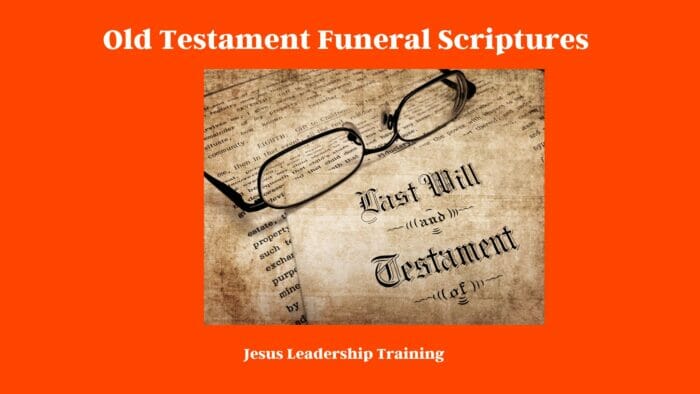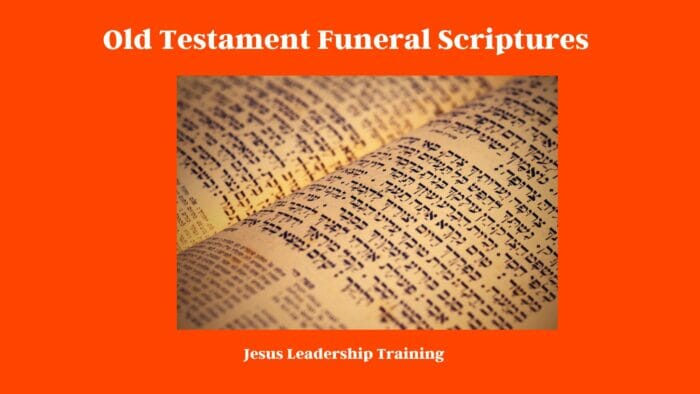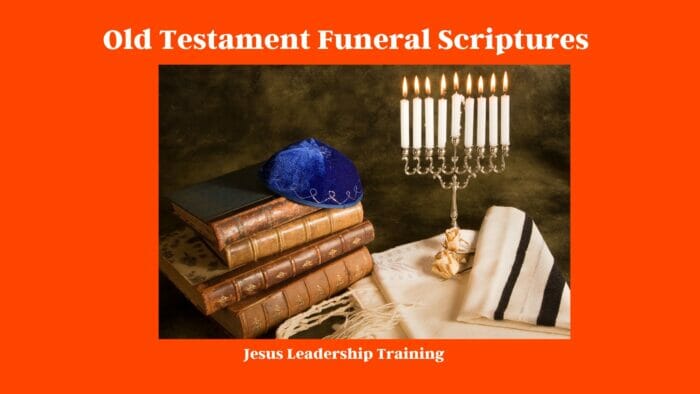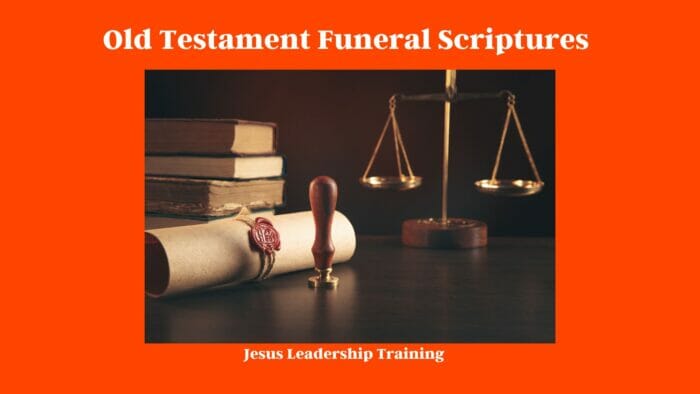Old Testament Funeral Scriptures – As we traverse the oft-unpredictable journey of life, one constant remains – the wisdom of ancient scriptures. The Old Testament, a profound cornerstone of faith for billions, holds valuable insights for life, death, and everything in between. In times of grief and mourning, we often turn to these timeless words for solace and understanding. Let’s embark on an in-depth exploration of Old Testament funeral scriptures, their context, interpretations, and applications in comforting the bereaved.
Table of Contents
Old Testament Funeral Scriptures: A Healing Balm
Old Testament Scriptures for Funerals KJV
As the first major section of the Christian Bible, the Old Testament is filled with a rich tapestry of narratives, songs, and prophetic utterances that offer guidance and solace. But why should we turn to these ancient verses during times of grief?
The Bible provides several accounts of deaths and mourning rituals, although it doesn’t always detail the specific funeral customs. However, from these narratives, we can infer some of the practices of that time. Here is a table of examples of Old Testament funerals:
| Person | Reference | Description |
|---|---|---|
| Sarah | Genesis 23:1-20 | After Sarah’s death, Abraham mourns for her. He then buys a piece of land to serve as a burial site, the Cave of Machpelah, where he buries Sarah. |
| Jacob | Genesis 49:33 – 50:14 | When Jacob dies in Egypt, Joseph orders the physicians to embalm his father, a process taking 40 days. The Egyptians mourned Jacob for 70 days. Afterwards, Joseph and his brothers carry Jacob’s body to Canaan, where he is buried in the Cave of Machpelah. |
| Moses | Deuteronomy 34:5-8 | Moses dies in Moab, as per God’s instructions. God Himself buries Moses in an unknown location in the valley in the land of Moab. The children of Israel mourn for Moses for 30 days. |
| Aaron | Numbers 20:27-29 | When Aaron dies on Mount Hor, as per God’s instructions, he is succeeded by his son Eleazar, and all the house of Israel mourned for Aaron 30 days. |
| King David | 1 Kings 2:10 | David was buried in the City of David, as was the custom for the kings of Israel. The account does not mention a period of mourning or specific funeral rites. |
| King Solomon | 1 Kings 11:41-43 | Like his father, Solomon was also buried in the City of David. The text does not provide details of the mourning or funeral rites. |

These accounts suggest that mourning periods, embalming, and burials in family tombs or specific locations were part of the death and funeral customs during the Old Testament times.
A Connection to the Eternal – Scriptures
In the face of loss, many grapple with profound questions about life and death, seeking solace in something beyond the transient nature of our existence. The Old Testament funeral scriptures connect us with the eternal, allowing us to frame our loss within a larger, spiritual context.
A Source of Comfort and Hope – Verses
Mourning is a deeply personal and often isolating experience. Amid the silence, words of scripture can become a gentle whisper of comfort and hope. The Old Testament is brimming with verses that acknowledge our pain while encouraging resilience and faith.
Exploring Key Old Testament Funeral Scriptures
Let’s delve into some of the most poignant Old Testament funeral scriptures that offer a beacon of hope and consolation in the face of loss.
Psalm 23:1-6 – The Lord Is My Shepherd – Psalms
This Psalm is perhaps one of the most recognized and comforting passages in the Bible. It depicts God as a Shepherd, guiding and providing for us even in the darkest valleys. It serves as a powerful reassurance of God’s love and protection, especially in times of grief.

Ecclesiastes 3:1-8 – A Time for Everything – Funeral Scriptures
This well-known passage speaks of the ebb and flow of life, acknowledging that there is a time for everything, including mourning. It offers a profound perspective, helping us accept the cycles of life and death as natural and necessary parts of our human experience.

Old Testament Funeral Scriptures – Verses
In the Old Testament, death is seen as a natural part of life’s cycle, and there are several scriptures that can provide comfort during the time of loss. These scriptures shed light on God’s mercy, our ephemeral existence on earth, and the eternal life that follows. Here are some of the most notable funeral scriptures from the Old Testament:
- Psalm 23:4: “Even though I walk through the valley of the shadow of death, I will fear no evil, for you are with me; your rod and your staff, they comfort me.” This verse highlights God’s presence and protection, even in the midst of life’s darkest moments.
- Psalm 34:18: “The Lord is close to the brokenhearted and saves those who are crushed in spirit.” This scripture emphasizes God’s compassion, assuring us that he is close to those who are grieving.
- Ecclesiastes 3:1-4: “There is a time for everything, and a season for every activity under the heavens: a time to be born and a time to die, a time to plant and a time to uproot, a time to kill and a time to heal, a time to tear down and a time to build, a time to weep and a time to laugh, a time to mourn and a time to dance.” This passage acknowledges the transient nature of life, asserting that there is a purpose and time for everything, including mourning and celebration.
- Isaiah 40:8: “The grass withers and the flowers fall, but the word of our God endures forever.” Here, the temporality of life is contrasted with the permanence of God’s word, providing reassurance of His eternal presence.
- Job 19:25-27: “I know that my redeemer lives, and that in the end he will stand on the earth. And after my skin has been destroyed, yet in my flesh I will see God; I myself will see him with my own eyes—I, and not another. How my heart yearns within me!” These verses express Job’s firm faith in God and the afterlife, offering solace in the hope of eternal life.
- Psalm 46:1-2: “God is our refuge and strength, an ever-present help in trouble. Therefore we will not fear, though the earth give way and the mountains fall into the heart of the sea.” This scripture emphasizes God’s role as a source of strength and refuge during times of difficulty and sorrow.
Remember, the selection of scripture for a funeral should be thoughtful, taking into consideration the beliefs and feelings of the deceased and their loved ones. The aim should be to provide comfort, hope, and solace during a difficult time.
Funeral Practices in the Old Testament – God
Funeral practices in the Old Testament were deeply rooted in tradition and held great significance for the Israelite community. Let’s explore some of the key aspects of these ancient customs.
Burial Traditions
In the Old Testament, burial was the primary method of laying the deceased to rest. The Israelites believed in honoring the body and returning it to the earth from which it came. Burial grounds were typically located outside the city walls, in designated areas known as “tombs” or “graves.” The process involved washing and anointing the body with aromatic spices before wrapping it in linen or burial garments. These practices emphasized respect for the deceased and the importance of the physical body.
Old Testament Burial Customs
Below is a table that lists various Old Testament burial customs:
| Custom | Description | Reference |
|---|---|---|
| Washing the Body | Before burial, the body was washed and prepared for internment. | Acts 9:37 |
| Use of Spices and Ointments | The body was often anointed with spices and ointments to slow decay and as a sign of respect. | John 19:39-40 |
| Mourning Period | There was often a specified period of mourning following death. Commonly, this period was 7 or 30 days, but it could extend up to a year for a close relative. | Genesis 50:10, Numbers 20:29, Deuteronomy 34:8 |
| Wearing Sackcloth and Ashes | Those who were mourning would often wear sackcloth and put ashes on their heads as an outward sign of their grief. | 2 Samuel 3:31 |
| Fasting | In some cases, those who were mourning might fast or abstain from certain foods. | 2 Samuel 1:12 |
| Professional Mourners | Professional mourners, including musicians, were sometimes employed to help express grief. | Jeremiah 9:17, Amos 5:16 |
| Burial Locations | Burial typically took place in a family tomb or a common city burial place. Some individuals, particularly those of high rank, were buried within their own cities. | Genesis 23:19, 1 Kings 2:10 |
| Stone Memorials | In some instances, a pillar or heap of stones was erected at the grave as a memorial. | Genesis 35:20 |
| Second Burial | In some cases, the bones were exhumed after decomposition and placed in a special repository called an ossuary. | 2 Kings 23:16-18 |
These practices varied over time and by region, and they might also have been influenced by the person’s social status and the specific circumstances of their death.
Mourning and Lamentations
Mourning played a crucial role in Old Testament funerals. It was a time for expressing grief and lamenting the loss of a loved one. Family members and close friends would gather to mourn together, often engaging in wailing, tearing their clothes, and covering themselves in ashes or sackcloth as signs of deep sorrow. The Book of Psalms contains numerous examples of lamentations that were recited or sung during funerals, providing comfort and solace to those in mourning.
Rituals and Offerings
Old Testament funerals involved various rituals and offerings as acts of devotion and remembrance. These practices aimed to honor the deceased and seek divine favor. Offerings of grain, wine, and incense were made to God, symbolizing gratitude and supplication. Additionally, mourners would sometimes pour out water or wine as a libation on the grave, signifying the pouring out of their grief and emotions. These rituals provided a framework for expressing both faith and the sorrow of loss.
Funeral Examples from the Old Testament
Let’s now explore some compelling examples of Old Testament funerals that offer us insights into the customs and practices of the time.
Abraham’s Burial
One of the earliest recorded funerals in the Old Testament is that of Abraham. After his death, his sons Isaac and Ishmael came together to bury him in the cave of Machpelah, located in the field of Ephron the Hittite. This burial site was purchased by Abraham as a family tomb, emphasizing the importance of familial ties and the continuity of generations.
Jacob’s Lamentation for Joseph
When Jacob believed his beloved son Joseph to be dead, he went into a deep state of mourning. He tore his clothes, put on sackcloth, and refused to be comforted. This intense grief demonstrates the emotional impact of loss in the Old Testament. However, Jacob’s mourning turned to joy when he discovered that Joseph was alive, showcasing the resilience and hope found within the narrative of funeral practices.
King David’s Funeral Dirge
King David, renowned for his musical talents and poetic expressions, composed a moving funeral dirge upon the death of King Saul and his son Jonathan. This elegy, known as the “Song of the Bow,” beautifully captures the deep friendship between David and Jonathan and serves as a poignant example of how music and poetry were intertwined with mourning in the Old Testament.
The Burial of Moses
Moses, the great leader of the Israelites, had a unique funeral as described in the Book of Deuteronomy. God Himself buried Moses in the land of Moab, in a valley opposite Beth Peor. The exact location of his burial remains unknown, adding an aura of mystery to the final resting place of this revered figure. This example showcases divine intervention and the special treatment accorded to significant figures in the Old Testament.
The Mourning of Job
The book of Job offers a profound exploration of grief and mourning. Job, who suffered immense loss and affliction, expressed his grief through mourning rituals, tearing his robe, and shaving his head. His friends joined him in mourning, sitting in silence for seven days and nights, offering support through their presence. Job’s story exemplifies the communal aspect of mourning and the importance of companionship during times of sorrow.
The Funeral of King Josiah
King Josiah, known for his religious reforms, was mourned by the entire nation when he was killed in battle. The prophet Jeremiah composed a lamentation for him, which is recorded in the Book of Lamentations. This funeral dirge mourns the loss of a righteous king and emphasizes the deep impact of his death on the nation. It serves as a testament to the significant role of funeral rituals in honoring and commemorating respected leaders.
Significance of Old Testament Funerals
Old Testament funerals held profound significance for the Israelite community. They served multiple purposes, ranging from honoring the deceased to providing comfort and affirming faith. Let’s explore the key dimensions of the significance of these funerals.
Honoring the Deceased
the deceased. They were seen as opportunities to pay tribute to the life and legacy of the individual who had passed away. Through various rituals, such as the anointing of the body, the wrapping in burial garments, and the construction of tombs or graves, the Israelites demonstrated their reverence for the physical remains of their loved ones. By providing a dignified farewell, they sought to convey their deep appreciation and respect for the person who had passed into the realm of the ancestors.
Comforting the Bereaved
Old Testament funerals also played a vital role in providing comfort and solace to the bereaved. The act of mourning allowed individuals to express their grief openly, creating a space for shared sorrow and emotional release. Family members, friends, and community members would gather to support one another, offering condolences, sharing memories, and offering words of encouragement. The communal nature of mourning helped alleviate the sense of isolation and provided a supportive network for those who were grieving.
Affirming Faith and Hope
In the Old Testament, funerals served as occasions to affirm faith and hope in the midst of loss. The rituals and offerings performed during these ceremonies were acts of devotion and trust in God. By making offerings of grain, wine, and incense, mourners expressed gratitude for the life of the deceased and sought divine favor and comfort. The recitation of lamentations and the singing of psalms provided spiritual solace and reminded the mourners of God’s presence even in times of grief. Through these practices, Old Testament funerals reinforced the belief in an eternal and loving God who sustained His people through both joyous and sorrowful times.
Old Testament Funeral Services where Scriptures would be used
Here’s a table that outlines parts of Old Testament funeral services where scriptures would typically be used:
| Funeral Service Part | Description | Typical Scriptures Used |
|---|---|---|
| Eulogy/Remembrance | This is a speech that honors the life of the deceased, often given by a close friend or family member. | Proverbs 31:10-31 (for a virtuous woman), Ecclesiastes 7:1-2 |
| Prayer | During the funeral service, a prayer would be said to comfort the mourners and honor the deceased. | Psalm 23, Psalm 34:18, Psalm 147:3 |
| Scripture Reading | Specific passages from the scriptures would be read that offer comfort, hope, or reflect on the nature of life and death. | Ecclesiastes 3:1-8, Psalm 90, Lamentations 3:22-26 |
| Sermon/Message | The priest or religious leader would give a message, often connecting the life of the deceased with broader spiritual themes. | Job 19:25-27, Daniel 12:2, Genesis 3:19 |
| Committal | This is the part of the service where the body is committed to its final resting place. | Genesis 3:19, Ecclesiastes 3:20, Ecclesiastes 12:7 |
Please note that the Old Testament was still in the process of being written and compiled during much of the time it covers, so many of the funeral customs it describes predate the texts themselves. These customs were also highly variable and evolved over time, depending on factors such as cultural influence, geographical location, and social status.
FAQs About Old Testament Funerals
Let’s address some frequently asked questions about funerals in the Old Testament:
Were cremations practiced in the Old Testament?
Cremation was not a common practice in the Old Testament. The Israelites primarily practiced burial as a way of returning the body to the earth. Burial was considered a reverent way of honoring the deceased and maintaining a connection with the ancestral land.
Did women participate in funeral rituals?
Yes, women played an active role in funeral rituals in the Old Testament. They would join the mourners in expressing grief, wailing, and tearing their clothes. Women had an essential role in the communal expression of sorrow and in providing support and comfort to the bereaved.
Were embalming practices common in the Old Testament?
Embalming practices, such as those practiced by the Egyptians, were not common in the Old Testament. The Israelites focused more on preserving the dignity of the deceased through washing, anointing, and wrapping in burial garments. The emphasis was on the honor and respect shown to the body rather than preservation techniques.
How long did the mourning period last?
The duration of the mourning period varied depending on the circumstances and cultural practices. In general, mourning periods could last anywhere from several days to several weeks. The intensity of mourning and the length of the period were influenced by factors such as the relationship to the deceased and the cultural norms of the time.
Were there any restrictions on funeral attire?
During mourning, it was customary for individuals to wear sackcloth, a coarse and humble fabric, as a symbol of grief and humility. The tearing of garments was also a common practice to visually represent the inner anguish and sorrow. These customs reflected the outward expression of mourning and the temporary suspension of regular attire.
Did the Israelites believe in an afterlife?
Beliefs about the afterlife in the Old Testament were not as explicitly developed as in some later religious traditions. However, there are indications that the Israelites had a belief in some form of existence beyond death. Concepts such as Sheol, a shadowy realm of the dead, and the hope of being gathered to one’s ancestors suggested an understanding of an afterlife, albeit with limited details.
Old Testament Scriptures for Funerals KJV
Most Popular Old Testament Funeral Scripture
Psalm 23:1-4
“The Lord is my shepherd; I shall not want. He maketh me to lie down in green pastures: he leadeth me beside the still waters. He restoreth my soul: he leadeth me in the paths of righteousness for his name’s sake. Yea, though I walk through the valley of the shadow of death, I will fear no evil: for thou art with me; thy rod and thy staff they comfort me.”
This Psalm is like a warm hug in the form of words. It speaks of God’s nurturing care and everlasting presence, even in the darkest moments. Whether you’re reading it aloud at a funeral or pondering it quietly, it brings an indescribable peace.
Encouraging Points from Psalm 23:1-4
- God as the Shepherd: The Lord is described as a shepherd, which symbolizes caring, guidance, and protection. Imagine the most loving and capable shepherd leading you through life; that’s what this point makes us feel.
- Restoration and Peace: Green pastures and still waters speak to our deep need for peace and spiritual rest. Even when life feels like a storm, there are still places of tranquility to be found.
- Path of Righteousness: The psalm assures us that God will guide us along the right path. So even in times of loss or uncertainty, you can trust that there’s a purposeful journey ahead.
- Valley of the Shadow of Death: Though death is mentioned, it’s only a ‘shadow,’ implying that it doesn’t have the final say. It’s a challenging passage but not the end of the journey.
- Fear No Evil: The psalm underscores the absence of fear when you’re walking with God. Knowing that a higher power accompanies you can bring significant comfort.
- The Rod and Staff: These are tools a shepherd uses for guiding and protecting sheep, symbolizing that God has the tools and the will to help us through our toughest times.
- Universal Comfort: Psalm 23 is cherished by people from various walks of life and religious beliefs. Its comforting words transcend denominational lines, making it perfect for communal grieving.
I hope this scripture and its encouraging points offer you or someone you know a ray of light in a time of darkness. Grief is a complicated, multi-layered experience, but you don’t have to go through it alone. 🌟
Final Thoughts – Old Testament Funeral Scriptures
In conclusion, exploring the examples of Old Testament funerals provides us with valuable insights into the customs, rituals, and significance of these practices in the lives of the Israelite community. From the burial traditions that emphasized the respect for the deceased, to the expressions of grief and the communal support during mourning, these funerals served as important events for honoring the departed and finding comfort in faith. While specific practices and beliefs may vary, the underlying themes of reverence, remembrance, and hope in the face of loss remain timeless and resonate across cultures and generations.
Best Bible Encyclopedias and Dictionaries
Below is a table featuring some highly regarded Bible Encyclopedias and Dictionaries along with their publishers and websites where they can be found or purchased.
| Title | Publisher | Website |
|---|---|---|
| The International Standard Bible Encyclopedia | Eerdmans | Eerdmans |
| Zondervan’s Pictorial Bible Dictionary | Zondervan | Zondervan |
| Easton’s Bible Dictionary | Thomas Nelson | Thomas Nelson |
| Holman Illustrated Bible Dictionary | B&H Publishing Group | B&H Publishing Group |
| The New Unger’s Bible Dictionary | Moody Publishers | Moody Publishers |
| HarperCollins Bible Dictionary | HarperOne | HarperOne |
| Vine’s Complete Expository Dictionary of Old and New Testament Words | Thomas Nelson | Thomas Nelson |
You can generally find these resources on the publishers’ websites, as well as other online book retailers such as Amazon or Christianbook. It’s always good practice to confirm availability and review additional details on the specific websites or other reliable online bookstores.





